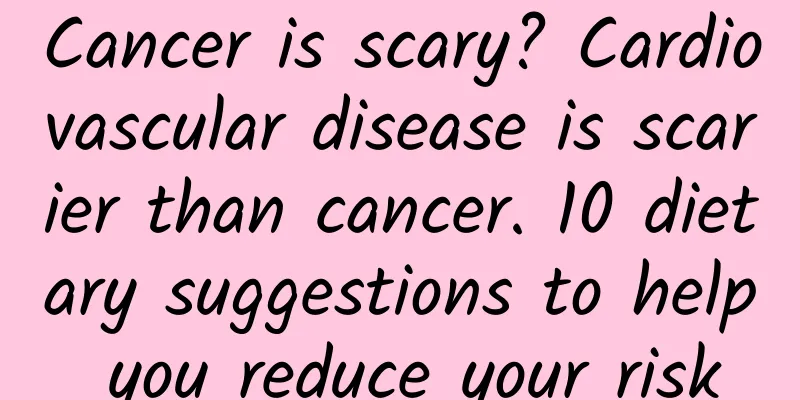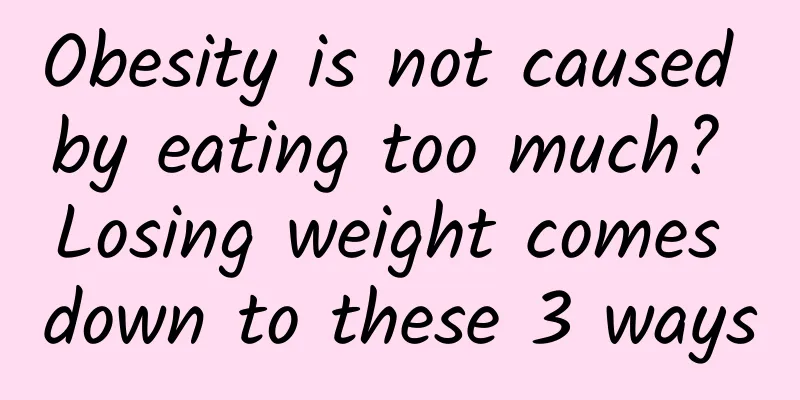Cancer is scary? Cardiovascular disease is scarier than cancer. 10 dietary suggestions to help you reduce your risk

|
Many people may often see news about sudden death from myocardial infarction on the Internet. The mortality rate caused by cardiovascular disease exceeds many people's imagination. Cancer is terrible, but cardiovascular disease is even more terrible. You may have been chatting and laughing with your family before going to bed yesterday, but you may have passed away the next morning. Cardiovascular disease is the leading cause of death in humans. Among every five Chinese who die, two die from cardiovascular disease. The high incidence of cardiovascular disease and the high risk of death are closely related to the quality of diet. How can we eat to reduce the risk of cardiovascular disease? The American Heart Association recently released a heart-healthy diet guide, which provides many dietary suggestions, some of which are also of great reference significance to Chinese people. How can Chinese people prevent cardiovascular disease through diet? Here are 10 dietary suggestions for you! I hope every Chinese person has a healthy heart. 1. Maintain a healthy weight With the improvement of material life, many people have become fatter than before. However, being overweight and obese brings more harm to the body. They are also listed as risk factors for cardiovascular disease by the American Heart Association. Keep your mouth shut and move your legs. Regular exercise helps to achieve energy balance. Ten thousand steps a day is not just a slogan, but also needs to be integrated into exercise. Adults should have at least 150 minutes of exercise time per week, and can choose moderate-intensity exercise to exercise. 2. Eat more vegetables Vegetables are the main food source of vitamin C. Vitamin C is involved in the synthesis of collagen, a component of the arterial wall. When it is deficient, it will increase the fragility and permeability of the arterial wall. Vitamin C is also involved in the reaction of reducing cholesterol to bile acid. When it is deficient, it will cause cholesterol metabolism disorders. And elevated plasma cholesterol levels are the main risk factor for cardiovascular disease. Increasing the intake of vegetables in the diet will also reduce the risk of cardiovascular disease. 3. Supplement folic acid appropriately The public's understanding of folic acid may remain at the level that pregnant women need to supplement folic acid. In fact, folic acid can reduce reactive oxygen and improve endothelial function, thereby avoiding micro-damage to the coronary arteries, eliminating the occurrence of arterial inflammation, and eradicating the basis of coronary heart disease. Although folic acid is widely present in a variety of foods, it is extremely easy to oxidize, and folic acid deficiency is relatively common, especially in middle-aged and elderly people. For people with coronary heart disease and risk factors for coronary heart disease, it is necessary to supplement folic acid-fortified foods appropriately, or directly take folic acid tablets to supplement folic acid. 4. Cereals: Whole grains are the first choice Whole grain foods contain complete endosperm, germ and bran. The main reason why whole grain foods are recommended is that they can provide the human body with rich dietary fiber. Dietary fiber has a positive effect on lipid metabolism, carbohydrate metabolism and prevention of atherosclerosis. Dietary fiber can inhibit the absorption of sugar and fat in the intestines, and form complexes with bile acid in the intestines to reduce bile acid reabsorption. Replacing processed rice and wheat flour with whole grain foods can reduce the risk of cardiovascular disease. 5. Choose healthy sources of protein Although the protein contained in animal foods is also high-quality protein, it also has high fat and cholesterol content. Replacing some animal protein foods with high-quality plant protein foods can help reduce the intake of saturated fat and cholesterol, and plant protein foods do not contain cholesterol. Soy foods have a high protein content and the plant sterols they contain are beneficial to the excretion of bile acid. Fish foods are also the first choice of high-quality protein foods, and fish oil also has important value in preventing and treating cardiovascular diseases. 】 6. Avoid processed meat Processed meat products have a lot of added sugar and salt during the production process. Although they taste delicious, they are not good for your health. In December 2015, the International Agency for Research on Cancer (IARC) under the World Health Organization listed processed meat products as foods with "high carcinogenicity". Frequent consumption of processed meat products will not only increase the risk of cancer, but also increase the risk of cardiovascular disease. Ham, sausage, meatballs, bacon, luncheon meat, crab sticks, etc. are not recommended. When eating meat, choose meat foods that can see the appearance of the meat itself, such as fresh beef, lamb, etc. 7. Say no to sugary drinks and all kinds of cakes Sugary drinks contain a high amount of sugar. Although some drinks do not taste sweet, they cannot hide the fact that they contain sugar, such as carbonated drinks. Although milk and eggs may be added to pastries such as bread, cakes and biscuits during the production process, these pastries also add fat and sugar during the production process. Excessive intake of free sugars and fats will increase the risk of high blood pressure, obesity, diabetes, high blood lipids, gout and cardiovascular disease. When purchasing pre-packaged foods, pay attention to reading the ingredient list and nutrition label of the food to understand the sugar and fat content of the food. 8. Keep your daily salt intake below 6 grams Salt is indispensable when cooking, and most of the time we consume too much salt. Excessive salt intake can cause high blood pressure, which is a pathogenic risk factor for cardiovascular disease and ranks first among cardiovascular risk factors. The daily intake of salt should be controlled within 6 grams. At the same time, we should also pay attention to the invisible salt in food. Some foods seem to have little to do with salt, but in fact they are big salt storage, such as sweet noodle sauce, ketchup, soy sauce, etc. When choosing pre-packaged foods, pay attention to the sodium content in the food nutrition label, and try to choose foods with low sodium content. 9. Don’t drink if you can avoid it Although many people have found various excuses for drinking, drinking is harmful to the body. Alcohol consumption as an independent risk factor for hypertension has long been confirmed by a large number of epidemiological studies, and as the amount of alcohol consumed increases, the risk of stroke and atrial fibrillation will also increase. If you can avoid drinking, you should try not to drink. If you really need to drink, you should be careful to avoid drinking on an empty stomach. Eating food to fill your stomach can slow down the absorption of alcohol. When drinking, you should also drink plenty of water to promote alcohol metabolism and reduce the harm of alcohol to the human body. 10. Choose vegetable oil as cooking oil In previous heart-healthy dietary guidelines, emphasis was placed on the intake of saturated fatty acids, trans fatty acids, and cholesterol, but the revised dietary guidelines recommend paying attention to the type of edible oil. Unsaturated fatty acids in fatty acids can lower low-density lipoprotein cholesterol levels and reduce cardiovascular risks. Unsaturated fatty acids in edible oils are mainly found in vegetable oils. Soybean oil, peanut oil, corn oil, sunflower oil, and flaxseed oil are the main sources of polyunsaturated fatty acids, while monounsaturated fatty acids are mainly found in rapeseed oil, olive oil, and tea seed oil. Although animal fats have a strong aroma, they are not recommended for consumption due to their high saturated fatty acid content. September 29th of every year is World Heart Day. Cardiovascular disease has become the "number one killer" threatening human health. And its harm is not limited by age, identity or region. Abandon bad eating habits and bad habits. No matter where you eat, you must follow the above 10 dietary suggestions, so that you can have a healthy heart and enjoy a happy life. |
<<: How do you keep the apples that Wang Yaping displayed in the space station fresh?
>>: This is cauliflower, this is not cauliflower, netizens: I just want to know if I can eat it
Recommend
New regulations on flat broadcast account creation tutorial: the underlying logic of flat broadcast account creation, suitable for the current account creation method
New regulations on Pingbo account creation tutori...
Advertising and marketing case analysis skills!
When it comes to learning methods, "looking ...
What are the benefits of mini programs for beauty and hairdressing? What is the best thing for WeChat mini-programs?
Q: What are the benefits of mini programs for bea...
Are we heading for the coldest winter yet?
The first snow in the second half of 2024 seems t...
Pain! Pain! Pain! Dinosaurs also suffer from cervical spondylosis?
The huge dinosaur fossil skeletons in the museum ...
The appointment was made so quickly! Who created the WeChat group for Jack Ma and Trump?
Today, I was eating noodles in a restaurant when ...
Low budget user growth model!
"Growth hacking" must be familiar to th...
Huawei defeats Apple and targets Samsung? The winner will be decided in the 5G arena
[[240542]] Recently, Samsung announced that it wi...
Community operation: Several methods to teach you how to overcome traffic barriers!
Flow Off If you build a community and run it very...
My neck makes a crackling sound when I turn it. Is it cervical spondylosis? The truth is...
Myth: "If you hear a crackling sound when yo...
Debunking the “non-myth” in the myth! Is the shark fin of the shark commander in “Nezha 2” really delicious?
In the vast ocean, sharks, known as the "kin...
A female internet celebrity weighing 312 pounds died in a weight loss camp! For severely obese people, this weight loss method is more reliable than excessive exercise
Recently, the news that the 312-pound internet ce...
Volkswagen explores more potential of MEB, ID.3 is expected to launch convertible version
As its ID.4 crossover enters the U.S. market, Vol...
How to move a 200-ton hotel? Just 700 bars of soap
What tools are needed to move a building? Recentl...
The Ministry of Industry and Information Technology has taken action to ban these behaviors in mobile apps. The end of rogue software is coming.
Why does a game app need to obtain our location i...









